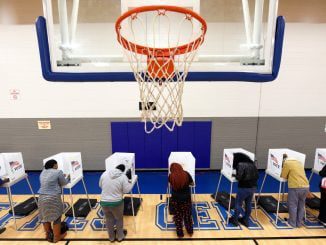ATLANTA — Changes to the way millions of Americans voted this year may have contributed to record turnout, but that’s no guarantee the measures making it easier for some to cast ballots will stick around for future elections.
Republicans in key states that voted for President-elect Joe Biden already are pushing for new measures, especially to absentee voting. It’s an option many states expanded amid the coronavirus outbreak.
An estimated 108 million people voted before Election Day, either through early in-person voting or by mailing or dropping off absentee ballots. That represented nearly 70% of all votes cast, after states took steps to make it easier to avoid the potential of crowded polling places during the pandemic.
A few states sent ballots to every registered voter while others dropped requirements that voters needed a specific excuse to cast an absentee ballot. Many states added drop boxes and expanded early voting options.
Republicans in Georgia have proposed adding a photo ID requirement when voting absentee, a ban on drop boxes and possibly a return to requiring an excuse for mail voting, such as illness or traveling for work on Election Day.
Early supporters of the ID requirement include Gov. Brian Kemp and Secretary of State Brad Raffensperger, Republicans who were criticized relentlessly by Trump for failing to back his fraud claims after losing in Georgia. A top deputy for Raffensperger has said the ID requirement would boost public confidence and refute any future claims of fraud.
In Pennsylvania, Republican lawmakers have been writing legislation to address what they claim are problems with the 2020 election and mail voting in particular, even though courts and elections officials have found no evidence of widespread problems.
“We’d like to tighten it up as soon as we can,” said Pennsylvania Senate Majority Leader Kim Ward.
Republicans hold majorities in both legislative chambers, and their support was instrumental in a year-old state law that expanded mail voting to all registered voters. One bill being discussed would go so far as to repeal that law and force voters to state an excuse to receive a ballot in the mail.
Michigan Secretary of State Jocelyn Benson, a Democrat, said lawmakers should look to the high turnout for the presidential election as a guide to improving what worked and then make changes sought by elections officials, such as providing more time for clerks to process mail ballots. Michigan does not allow that work to begin until the day before Election Day.
Lisa Schaefer, executive director of the County Commissioners Association of Pennsylvania, said her organization also would like to see lawmakers focus on reducing the strain facing local election officials.
“The more time that we spend in debating other issues, the less time that we have to do something good with changes to the election code,” Schaefer said.
Democrats and left-leaning groups have already begun pushing back, saying Republicans should be focused on protecting voter access to the polls.
They say ID requirements accomplish little, but have a high cost.
“It’s a solution in search of a problem,” said California Secretary of State Alex Padilla, a Democrat who was recently tapped to fill the U.S. Senate seat of Vice President-elect Kamala Harris. “It will undoubtedly have the net effect of disenfranchising a lot of people without necessarily improving election security.”
Padilla supports sending registered voters a ballot in the mail.
Not all Republicans are seeking to add restrictions, though.
In Ohio, Secretary of State Frank LaRose said his legislative priorities are to expand early voting locations, increase oversight of election vendors, add an online option for requesting absentee ballots and address confusion over drop boxes.
“Ohio’s got a good thing going, but we don’t want to rest on our laurels,” said LaRose, who wants his priorities approved by the Republican-dominated legislature.
Kentucky Secretary of State Michael Adams said the pandemic forced the state to implement early voting, which proved popular among voters of both major parties. The Republican said he thinks it’s likely state lawmakers will create an early voting policy for subsequent elections and has heard of no opposition to that in the GOP-controlled legislature.
“It just makes voting easier,” he said.



